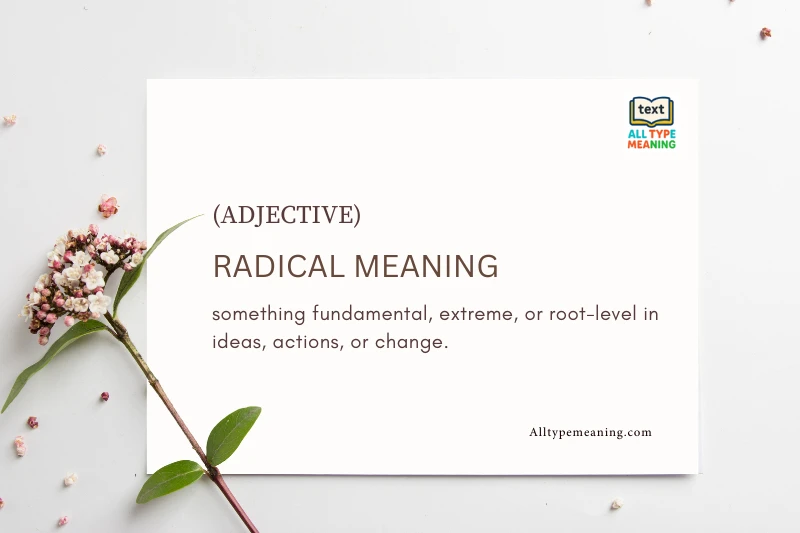Radical meaning is more fascinating than you might think! 🤔 Whether you’re a student preparing for exams or someone curious about language, understanding this powerful word can open doors to better communication and comprehension. This comprehensive guide will explore every aspect of this versatile word, making it easy for everyone to grasp its significance!
The term “radical” appears in various contexts – from mathematics to politics, from chemistry to everyday conversations. Let’s dive deep into this remarkable word and discover its multiple dimensions across different languages and fields of study.
1. What Does Radical Mean? The Complete Definition 🔍
The word “radical” comes from the Latin word “radix,” meaning “root.” At its core, radical meaning refers to something fundamental, extreme, or relating to the root or origin of something. Here are the primary definitions:
Primary Meanings:
- Fundamental or Basic: Relating to the essential nature of something
- Extreme or Drastic: Advocating complete political or social change
- Mathematical Term: The symbol (√) used to indicate roots
- Chemical Term: An atom or group of atoms with unpaired electrons
- Linguistic Term: The root form of a word
In everyday English, when someone says “That’s a radical idea!” 💡, they usually mean it’s either very innovative or extremely different from conventional thinking. The word carries both positive and negative connotations depending on the context.
Examples of Radical in Context:
- “The company implemented radical changes to improve efficiency.”
- “She has radical views about education reform.”
- “The doctor recommended radical treatment for the condition.”
- “That skateboard trick was totally radical!” (slang usage)
2. Radical Meaning in Indian Languages: A Cultural Bridge 🌉
Understanding radical meaning in Hindi and other Indian languages helps millions of students and learners connect with this concept more effectively. Let’s explore how different Indian languages interpret this word:
Radical Meaning in Hindi (रेडिकल का अर्थ):
In Hindi, “radical” translates to several terms:
- मूलभूत (Moolbhut) – meaning fundamental or basic
- क्रांतिकारी (Krantikari) – meaning revolutionary
- चरम (Charam) – meaning extreme
- आमूलचूल (Amulchul) – meaning complete transformation
Radical Meaning in Bengali (র্যাডিক্যাল অর্থ):
Bengali speakers understand radical as:
- মূলগত (Mulgoto) – fundamental
- বিপ্লবী (Bipllobi) – revolutionary
- চরমপন্থী (Chorompanthi) – extremist
- আমূল (Amul) – from the root
Radical Meaning in Telugu (రాడికల్ అర్థం):
In Telugu, the word translates to:
- మూలాధార (Muladhara) – fundamental
- విప్లవకారి (Viplavakari) – revolutionary
- తీవ్రమైన (Teevramaina) – intense or extreme
Radical Meaning in Tamil (ரேடிக்கல் பொருள்):
Tamil interpretations include:
- மூலாதார (Muladhara) – fundamental
- புரட்சிகர (Puratchikara) – revolutionary
- தீவிர (Theevira) – extreme
Radical Meaning in Marathi (रॅडिकल अर्थ):
Marathi speakers use:
- मूलभूत (Moolbhut) – basic or fundamental
- क्रांतिकारी (Krantikari) – revolutionary
- टोकाचा (Tokacha) – extreme
Radical Meaning in Kannada (ರಾಡಿಕಲ್ ಅರ್ಥ):
In Kannada, it means:
- ಮೂಲಭೂತ (Mulabhuta) – fundamental
- ಕ್ರಾಂತಿಕಾರಿ (Krantikari) – revolutionary
- ತೀವ್ರ (Teevra) – intense
3. Radical in Different Fields: Academic and Professional Usage 🎓
Understanding radical meaning becomes even more important when we explore its usage across various academic and professional fields. Each discipline has adopted this word with specific connotations:
Mathematics and Radical Expressions 🔢
In mathematics, a radical refers to the root symbol (√) and expressions involving roots:
- Square radical: √16 = 4
- Cube radical: ∛27 = 3
- Radical equations: Equations containing variables under radical signs
Mathematical radicals help students solve complex problems involving powers and roots. This usage is probably the most precise and technical application of the word.
Chemistry and Free Radicals ⚗️
In chemistry, a radical is an atom or molecule with unpaired electrons:
- Free radicals: Highly reactive chemical species
- Organic radicals: Carbon-based radicals
- Radical reactions: Chemical processes involving radicals
These chemical radicals play crucial roles in various biological processes and industrial applications.
Politics and Social Change 🏛️
In political contexts, radical meaning often refers to:
- Radical movements: Groups advocating fundamental change
- Radical policies: Extreme measures for social reform
- Radical thinking: Revolutionary approaches to governance
Linguistics and Word Roots 📝
In language studies, a radical represents:
- Root morphemes: Basic meaningful units of words
- Radical forms: Base forms from which words derive
- Etymological radicals: Historical roots of words
4. How to Use Radical Correctly: Grammar and Context 📚
Proper usage of “radical” depends heavily on context and audience. Here’s how to use this word effectively:
As an Adjective:
- “She proposed a radical solution to the problem.” ✅
- “The radical changes improved the system significantly.” ✅
- “His radical approach surprised everyone.” ✅
As a Noun:
- “The political radical organized protests.” ✅
- “Mathematical radicals can be simplified.” ✅
- “Free radicals cause cellular damage.” ✅
Common Mistakes to Avoid ❌:
- Don’t overuse “radical” in casual conversation
- Be careful about political implications when using the word
- Understand your audience – some may find “radical” threatening
- In academic writing, be specific about which type of radical you mean
Synonyms and Alternatives:
When “radical” might be too strong, consider:
- Fundamental (for basic meanings)
- Innovative (for creative meanings)
- Revolutionary (for change-oriented meanings)
- Extreme (for intensity meanings)
- Progressive (for forward-thinking meanings)
5. Cultural Impact and Modern Usage of Radical 🌍
The radical meaning has evolved significantly in modern times, especially with the rise of social media and global communication. Understanding these contemporary uses helps students and professionals communicate more effectively:
In Social Media and Pop Culture 📱:
- “That concert was totally radical!” (meaning awesome)
- “Radical self-care Sunday” (meaning complete or thorough)
- “Radical transparency in business” (meaning complete openness)
In Educational Settings 🎒:
Teachers and students frequently encounter “radical” in:
- History classes: Learning about radical movements
- Science classes: Understanding radicals in chemistry and math
- Literature: Analyzing radical themes in texts
- Social studies: Discussing radical social changes
In Professional Environments 💼:
Modern workplaces use “radical” to describe:
- Radical innovation: Breakthrough technologies
- Radical restructuring: Complete organizational changes
- Radical thinking: Creative problem-solving approaches
Global Understanding 🌐:
As English becomes a global language, understanding Radical Meaning helps:
- International students preparing for English exams
- Business professionals working in multinational companies
- Academic researchers publishing in international journals
- Social media users understanding global conversations
Conclusion: Mastering Radical Meaning for Better Communication 🎯
Understanding radical meaning is essential for anyone looking to improve their English vocabulary and communication skills. Whether you’re a student preparing for competitive exams, a professional working in an international environment, or simply someone curious about language, this comprehensive guide provides all the tools you need.
Remember that “radical” is a versatile word with applications across multiple fields – from mathematics and chemistry to politics and everyday conversation. Its rich history from Latin “radix” (root) continues to influence how we use it today.
For students from different linguistic backgrounds, knowing radical meaning in Hindi, Bengali, Telugu, Tamil, Marathi, and Kannada creates bridges between languages and cultures. This multilingual understanding enhances both comprehension and communication abilities.
👉 Keep practicing in different contexts, and soon you’ll be using radical with confidence in both academic and casual conversations. And if you enjoy exploring fascinating slang terms, don’t miss our guide on gringo meaning for another exciting language journey! 🌟
Frequently Asked Questions (FAQs) 🤔
1. What is the most common radical meaning?
A: The most common radical meaning refers to something fundamental, extreme, or relating to complete change. In everyday usage, it often means “very different from the usual or traditional” or “advocating extreme measures.”
2. How do you pronounce “radical” correctly?
A: “Radical” is pronounced as RAD-i-kal with stress on the first syllable. The ‘a’ sounds like ‘a’ in “cat,” and the word has three syllables total.
3. Is “radical” always a negative word?
A: No! Radical meaning can be positive, negative, or neutral depending on context. In 1980s slang, “radical” meant “awesome” or “cool.” In academic contexts, it’s often neutral. Only in political contexts might it carry negative connotations for some people.
4. What’s the difference between “radical” and “drastic”?
A: While both words suggest extreme change, “radical” emphasizes going to the root or foundation of something, while “drastic” simply means severe or extreme in effect. Radical changes are fundamental; drastic changes are just intense.
5. How is “radical” used in different Indian languages?
A: Radical meaning in Hindi, Bengali, Telugu, Tamil, Marathi, and Kannada varies slightly but generally covers concepts of fundamental change, revolutionary thinking, or extreme measures. Each language has multiple translations depending on the specific context and usage.
Want to learn more word meanings? Visit All Type Meaning for comprehensive guides to expand your vocabulary and improve your language skills! 📚✨

